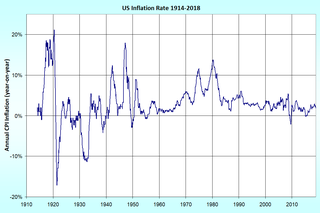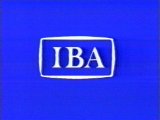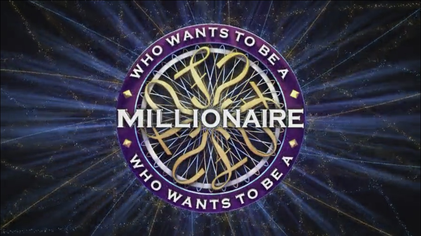
Greed is an American television game show that was first broadcast on Fox in November 4, 1999 and last broadcast on July 14, 2000 with the total of 44 episodes in one season. Chuck Woolery was the show's host, with Mark Thompson serving as a primary announcer. The game consisted of a team of contestants who answered a series of multiple-choice questions for a potential prize of up to $2 million. The program's catchline is "The Richest Most Dangerous Game In America".

Win Ben Stein's Money is an American television game show created by Al Burton and Donnie Brainard that aired first-run episodes from July 28, 1997 to January 31, 2003 on Comedy Central, with reruns airing until May 8. The show featured three contestants who competed to answer general knowledge questions in order to win the grand prize of $5,000 from the show's host, Ben Stein. In the second half of each episode, Stein participated as a "common" contestant in order to defend his money from being taken by his competitors. The show won six Daytime Emmy awards, with Stein and Jimmy Kimmel, the show's original co-host, sharing the Outstanding Game Show Host award in 1999.
The Joker's Wild is an American television game show that has aired at different times since the 1970s. Contestants answer questions based on categories determined randomly by a mechanism resembling a slot machine. The show's title refers to the game's slot-machine mechanism also having jokers.
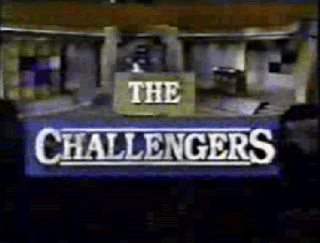
The Challengers is an American game show that aired in syndication from September 3, 1990 until August 30, 1991. The show remained in production for its entire run on the air, differing from most syndicated game shows which usually wrapped in the early summer.
Idiot Savants was an American television game show on the MTV network which ran from December 9, 1996 to April 25, 1997. It was created by Michael Dugan and Chris Kreski, directed by Steve Paley, and hosted by comedian Greg Fitzsimmons.

Celebrity Squares is a British comedy game show based on the American comedy game show Hollywood Squares. It first ran from 20 July 1975 to 7 July 1979 and was hosted by Bob Monkhouse, then from 8 January 1993 to 3 January 1997 and was also hosted by Monkhouse.

Debt was an American game show hosted by Wink Martindale which aired on Lifetime from June 3, 1996 to August 14, 1998. The show featured contestants who were trying to earn money to get out of debt.

History IQ is a game show on the History Channel which premiered on October 2, 2000 and aired for two seasons. Marc Summers hosted and Harvey announced, reuniting the two from the Nickelodeon game show Double Dare. History IQ was produced by Glow in the Dark Productions.
Deal or No Deal was an Australian game show that aired on the Seven Network between 2003 and 2015. It was the first international version of the game show, after the original Dutch version. It was the first of the versions to use the Deal or No Deal name. The show was recorded at the studio facilities of Global Television located in the Melbourne suburb of Southbank. The top prize of $200,000 was won by four contestants.
Quicksilver is an American game show that saw contestants answering trivia questions that more often than not resulted in responses that were unintentional puns. The show aired on USA Network from July 27, 1994 to December 23, 1994, with reruns continuing until October 13, 1995 and was produced by Stone Stanley Entertainment. Ron Maestri hosted.
À prendre ou à laisser is the French version of Deal or No Deal. It was premiered on 12 January 2004 on TF1. It is hosted by Arthur, the former vice-president of Endemol-France and a popular radio presenter.

The Big Surprise is a television quiz show broadcast in the United States by NBC from October 8, 1955, to June 9, 1956, and from September 18, 1956, to April 2, 1957. It was hastily created by NBC in response to the ratings success of The $64,000 Question, which had premiered on CBS in summer 1955 and almost instantly became a hit. The Big Surprise offered a grand prize of $100,000.
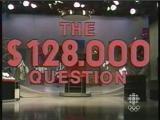
The $128,000 Question is an American game show which aired from 1976–1978 in weekly syndication. This revival of The $64,000 Question was produced by Cinelar Associates and distributed by Viacom Enterprises.

1 vs. 100 is an Australian spin-off game show based on the American version of the same name and the original Dutch version created by Endemol. The game pits one person against 100 others for a chance to win one million dollars. The program is hosted by former Nine Network CEO and personality Eddie McGuire.
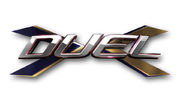
Duel is an American game show hosted by Mike Greenberg that first aired from December 17 to December 23, 2007 on ABC. The show aired as a week-long six-episode tournament at 8:00 PM from Monday through Friday with the finale on Sunday.

Who Wants to Be a Millionaire? is the Irish version of the British quiz show Who Wants to Be a Millionaire? which aired on RTÉ One from 2000 to 2002. It was presented by Gay Byrne. The format was the same as on the British show, and the 15 incremental prize amounts had the same numeric values, from 100 up to 1,000,000. These values were denominated in Irish pound in 2000 and 2001, and in euro in 2002, after the euro changeover.
We Are Singaporeans is a game show that aired on Singaporean English language channel Mediacorp Channel 5 about everything and anything Singapore from history to culture to trivia. Hosted by Hossan Leong and Najip Ali, contestants will get the chance to walk away with up to $20,000 every week. The show, which will run for 15 weeks, will feature guest appearances by local celebrities and icons who will ask contestants questions relating to a particular topic.

The Hong Kong version of 1 vs. 100, called 以一敵百, was produced by Asia Television and it is the first Chinese language version of the show. It was first broadcast as a 1-hour special on September 24, 2006 where the contestants were winners of at least HK$30,000 on Who Wants to Be a Millionaire?, then it was aired every weeknight between September 25, 2006 and December 15, 2006. It was hosted by lyricist Wyman Wong (黃偉文).
Divided is an American television game show broadcast by Game Show Network (GSN) based on the British series of the same name. Each episode consists of four contestants playing as one team who must agree on answers to questions they are given. The longer it takes the team to come to an agreement, the less money the team earns for each question. The series, hosted by Mike Richards, premiered January 19, 2017, with some critics believing that the show's name and timing were appropriate given the tumultuous preceding presidential election and its premiere date coming the day before the inauguration.
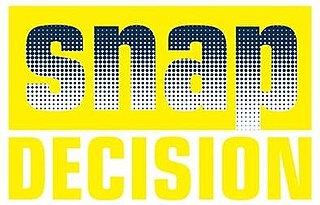
Snap Decision is a half-hour comedy game show featuring David Alan Grier as the host. It airs on the Game Show Network and is also syndicated on Tornante-Sinclair stations. It premiered on August 7, 2017.


